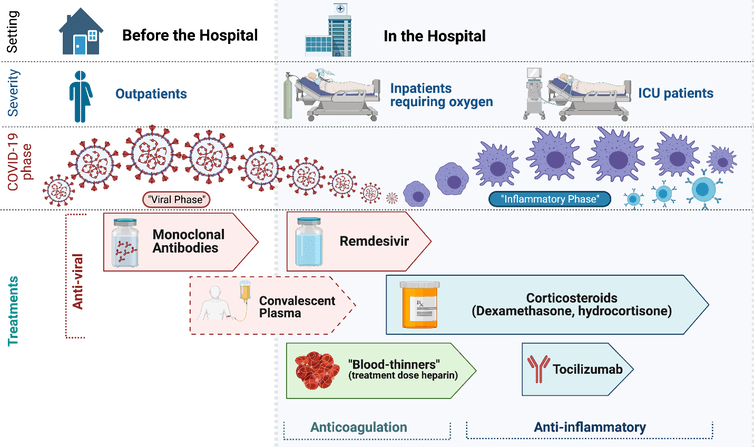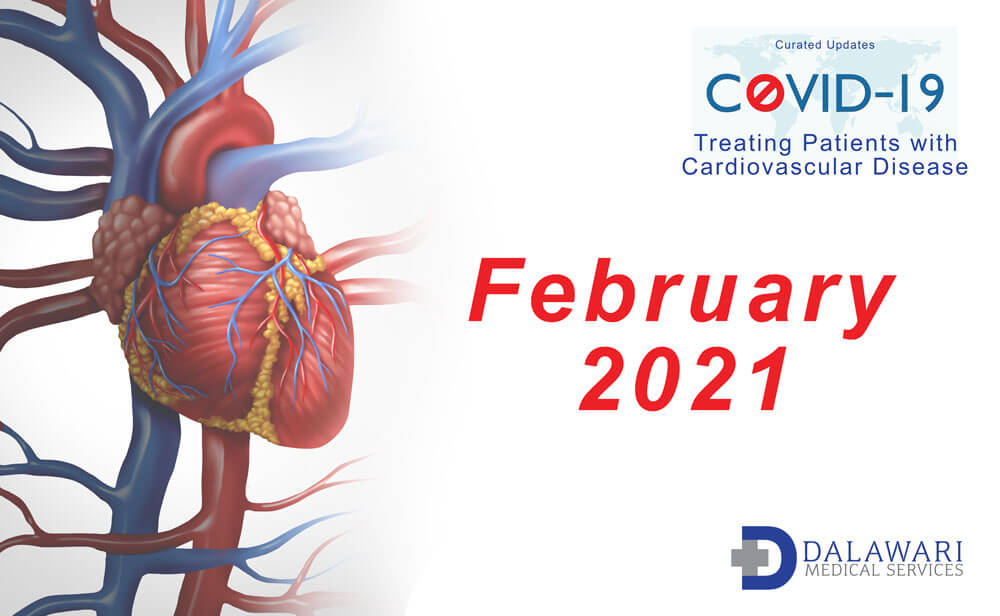COVID-19: News & Updates from February 2021
As a response to the Coronavirus/Covid-19 outbreak, many medical associations and organizations have released statements specifically related to treatment for cardiovascular patients.
These resources provide credible and trustworthy information. Many if not most, speak to the need for more detailed research and data, to help guide us as we develop new standards of practice to ensure optimal care based on clinical practice rather than speculation.
- Wear a mask in public places
- Social distancing - stay at least 6 feet away from other people
- Wash your hands frequently - with warm soapy water for at least 30 seconds
- Avoid crowds, confined and poorly ventilated spaces.
Eagle's Eye View: COVID-19 Tip of the Week
02 February, 2021 - ACC Eagle's Eye View: COVID-19 Tip of the Week
Dr. Kim Eagle provides a weekly tip for clinicians on the front lines of the COVID-19 pandemic. How do health care workers hospitalized with COVID-19 fare when compared to the general population?
Please visit the ACC COVID-19 Hub for additional resources and information...
Outcomes of In- and Out-of-Hospital Cardiac Arrest in COVID-19
05 February, 2021 - American College of Cardiology
Authors: Sultanian P, Lundgren P, Strömsöe A, et al.
Citation:
Cardiac Arrest in COVID-19: Characteristics and Outcomes of In- and Out-of-Hospital Cardiac Arrest. A Report From the Swedish Registry for Cardiopulmonary Resuscitation. Eur Heart J 2021;Feb 5: [Epub ahead of print].
Summary By:Thomas C. Crawford, MD, FACC>
Quick Takes
-
During the pandemic phase, COVID-19 was involved in ≥10% of all out-of-hospital cardiac arrests (OHCAs) and 16% of in-hospital cardiac arrests (IHCAs).
-
Among COVID-19 cases, 30-day mortality was increased 3.4-fold in OHCA and 2.3-fold in IHCA.
COVID-19 Modeling and the Path to Herd Immunity
AP-NORC poll: A third of US adults skeptical of COVID shots
Researchers Investigate What COVID-19 Does to the Heart
10 February, 2021 - jamanetwork.com
The first sign of heart damage was in their blood. In early case reports from Wuhan, China, where the novel coronavirus emerged, an unexpected number of patients hospitalized with the respiratory infection had elevated levels of cardiac troponin, a marker of myocardial—heart muscle—injury.
Next came the echocardiograms suggesting functional abnormalities in many patients’ hearts. Soon it was obvious that myocardial injury heralded poor prognosis for patients hospitalized with coronavirus disease 2019 (COVID-19).
It wasn’t surprising that patients with preexisting cardiovascular issues—prior heart failure, coronary artery disease, hypertension—were more likely to fare poorly, based on other respiratory illnesses. But so were those without a history of heart problems who had elevated troponin levels.
Physicians and scientists wondered then, as now: How common is heart injury across the spectrum of severe acute respiratory syndrome coronavirus 2 (SARS-CoV-2) infection, from asymptomatic cases to critical disease?
The Coronavirus is Here to Stay — here’s what that means
Damage to the heart found in more than half of COVID-19 patients discharged from hospitals
This Week in Cardiology Podcast
19 February, 2021 - Medscape -
>For the week ending February 19, 2021, John Mandrola, MD comments on the following news and features stories.
Discussed:
COVID-19 vaccine still important for those with cardiovascular risk factors
20 February, 2021 - SCNOW.com - ABDALLAH KAMOUH, M.D. MUSC Health-Cardiology
During the past year, more than 110 million people were infected by the COVID-19 virus. More than 28 million of these infections took place in the United States, responsible for more than 480,000 deaths.
Although death related to COVID-19 infection spans all ages, patients with cardiovascular risk factors, with heart disease and stroke, are more susceptible to die than the general population.
COVID-19 can directly affect the heart. Patients infected with the virus can have high-grade fever, fluctuation in blood pressure, low oxygen levels and clotting of the blood.
All of these factors can lead to an increased risk of heart failure decompensation, heart attacks, abnormal heart rhythm and cardiac death more so in patients with underlying heart disease.
Given the threat of COVID-19 infection for patients with heart disease, the Centers for Disease Control and Prevention (CDC), the American Heart Association (AHA) and many other national heart organizations encourage patients with heart diseases and stroke to take the COVID-19 vaccine.
Some people have expressed concerns about taking the vaccine. Science and medical experts and national medical associations are confident that the benefit of vaccination far exceeds the very small, rare risks.
Many Black Americans aren’t rushing to get the COVID-19 vaccine – a long history of medical abuse suggests why
24 February, 2021 - theconversation.com -
Black Americans have been the least inclined of any racial or ethnic group to say they’d get vaccinated against the coronavirus.
The proportion of Black people who said they’ll probably or definitely take the shot has risen over time – but even by mid-January, with two COVID-19 vaccines authorized for emergency use in the U.S., only 35% of Black survey respondents said they’d get it as soon as they could, or already had gotten the shot...
6 COVID-19 treatments helping patients survive
01 March, 2021 - theconversation.com -
A year ago, when U.S. health authorities issued their first warning that COVID-19 would cause severe “disruption to everyday life,” doctors had no effective treatments to offer beyond supportive care.
There is still no quick cure, but thanks to an unprecedented global research effort, several treatments are helping patients survive COVID-19 and stay out of the hospital altogether.
COVID-19 treatments target two broad problems: the coronavirus’s ability to spread through the body, and the damage caused by the body’s immune system response. When the virus enters the body, it takes over cells and uses them to replicate itself. In response, the body sends inflammatory signals and immune cells to fight the virus. In some patients, that inflammatory response can continue even after the virus is under control, leading to damage in the lungs and other organs.
The best tool is prevention, including using face masks and vaccines. Vaccines train the immune system to fight off attackers. With less risk of an uncontrolled infection, they can cut the risk of death from COVID-19 to near zero. But vaccine supplies are limited, even with a third vaccine now authorized for U.S. use, so treatments for infected patients remain crucial.
As doctors who work with COVID-19 patients, we have been following the drug trials and success stories. Here are six treatments commonly used today for COVID-19.

Treatments for COVID-19 and their timing. Georgios D. Kitsios, CC BY-ND
As you’ll see, timing matters...
Do you have questions about a medical case or need help understanding treatment plans and options?
Health & Patient Advocacy | Medical Case Review
Medical Expert Witness
Dalawari Medical Services - Medical Consulting
Click here to Contact Us via email or Call + (804)-991-4109




